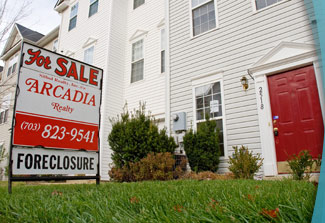Mortgage stress hits rich
MORE than 700,000 households will come under some mortgage stress by June, with financial grief also hitting higher income families.

Mortgage stress hits rich
AUSTRALIA'S mortgage crisis is deepening and for the first time threatening to produce "affluent stress" - financial grief among higher income families - as new figures show that more than 700,000 households will come under some mortgage pressure by June.
About 300,000 are expected to fall into the worst "severe stress" category, possibly leading to forced sales and foreclosures, as consumers struggle under the weight of higher interest rates and rising living costs.
The major banks, faced by higher funding costs, are expected to again raise their variable mortgage rates by about 15 basis points, putting even more households under severe mortgage stress.
The dire predictions are contained in the latest JP Morgan/Fujitsu Mortgage Industry Report. It says more than 700,000 households will come under "mild" stress, the symptoms of which include borrowing on credit cards to make mortgage repayments.
"This affluent stress is hitting customers who are normally insulated from rate rises, but a combination of factors - rising rates, hikes in school fees and margin calls on shareholdings - is creating a perfect storm Australian banks cannot afford to ignore," said co-author Martin North.
Among the "problem" affluent suburbs in Sydney are Bondi, Chatswood and the Northern Beaches.
For every 0.25 per cent rate rise from June, Mr North told The Australian, "about 75,000 additional people (will) tip over from mild to severe stress" and about "150,000 go from no stress to mild stress".
In the past week, the major banks have raised their variable rates by up to 35 basis points, 10 basis points above the Reserve Bank's move earlier this month.
"When you look at the macro-environment for the banks, it's certainly much more challenging ... probably the most challenging we have seen since 1992," said JPMorgan analyst Brian Johnson.
"The operating conditions for the Australian banks, as far as the global credit crunch (is concerned), are getting worse," he added, pointing out that the yield curve had recently steepened and the banks were "shortening" the duration of their funding profiles.
Mr Johnson said the banks had passed on "nowhere near" the full increase in their cost of funds.
"When you speak to them behind the scenes, they'll tell you that probably they need to move another 15 basis points," said Mr Johnson. However, he said, that would be challenging in the current environment.
Bank profits are now expected to come under pressure.
"The real question is, if the RBA does not move interest rates, can the banks actually increase their home loan rates?" he said.
The probability of a further RBA rate rise in May has now dropped sharply.
"I would suggest ... their profits have certainly significantly been pressured at the moment," Mr Johnson said.
He believes the "headwinds" building up will be more of a problem for bank earnings next year.
Mr North added that Fujitsu's forward projections showed "delinquencies will continue to rise, and significantly".
To date, the delinquency on most loans has only crept up to just above 1 per cent in recent months although the problem on wholesale loans, provided to mortgage arrangers, is now about three times that level.
The report also questions the validity of the banks' mortgage stress testing.
"I don't know how the Australian banks can really do their mortgage stress testing when no one knows how much credit is actually in each household," Mr Johnson said. He estimates that the average household has three months of disposable income on its credit card.
Mr North also added that "one in 20 loans, through a (mortgage) broker channel ... have had some untruth in them".
The Australian Securities and Investments Commission released an alarming report that showed that a number of fringe lenders and mortgage brokers were refinancing consumers into loans they could not afford.
The report found some fringe lenders would allow borrowers to enter into a cycle of unaffordable loans in which they defaulted and refinanced several times until the equity in their home was exhausted.
Perhaps a bigger concern Mr Johnson highlighted in the report was "credit rationing". That means as banks find it harder to get debt funding, they will start to ration the debt they provide to ompanies. He said that would have "implications for the broader economy".
Mortgage broker numbers are tipped to halve from 10,000 to 5000 in the next two years.



